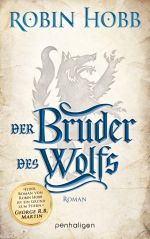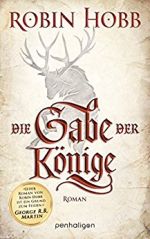von Lars Jeske
Ringbote: The „Farseer“ trilogy was not your debut, but the first book published as Robin Hobb. It became a huge success worldwide. Have you been expecting this worldwide acceptance and heed? Could’ve you even hope to get that much attention at this time?
Robin Hobb: I think that often that ‚overnight success‘ we see in publishing is a myth! I had been a published novelist for over a decade before „Assassin’s Apprentice“ was published, and my short stories had been published for twenty years!
The writers who seek publication (and there are many writers who write solely for their own pleasure!) do hope for success, and great success is always a daydream. Since I had been writing for so long, I hoped that „Assassin’s Apprentice“ would do at least as well as my previous books.
It was given a huge boost by my very enthusiastic US publisher. Bantam gave me an incredible Michael Whalen cover, and also put free copies into the ‚goody bags‘ given away at the world convention that year. That, I think, was instrumental in my reaching a wider readership. And from there, I hope it is true that the quality of the story won the readers over.
Ringbote: Fantasy books are a big part in the book market. Not only due to cross media spotlights from
cinema adaptions like „The Lord of the Rings“ or TV shows like „Game of Thrones“ or „the Shannara Chronicles“. Your saga about Fitz Chivalric „Farseer“ begun in 1995 and is now published again in Germany as edited, completely new edition. How does it feel to have written books which are still relevant after all those years and are published over and over again even without the additional support of a TV show?
RH: I feel honored that my publishers are confident in the story, and willing to invest in incredibly beautiful new covers to bring a new generation of readers to the story. This has happened in the US, UK and Australia, France and the Netherlands and Poland as well as in Germany.
I think that fantasy is a slice of literature that is not as bound by time as other books. A present day romance or mystery may feel ‚dated‘ by the lack of cell phone usage in the plot, or by older social attitudes. Fantasy often takes place in the ‚once upon a time‘ setting that so many of us share, a time of castles and swords and heroic quests. It really does speak to an international audience, and generation after generation of readers can discover stories and characters to cherish. When I open „The Lord of the Rings“, I can fall right back into the story again, effortlessly. The same is true of „The Last Unicorn“ or even the tales of „Conan the Barbarian“.
To me, the biggest compliment I can receive is when emails tell me that a father or grandmother has shared my books with a younger member of the family. It is such an honor to be part of a family’s shared set of books, in much the way that my father passed on his copies of „Robin Hood“ and „Kidnapped“ and „Treasure Island“ to me.
Ringbote: Speaking of bringing a book alive in a new media. Would you be interested in the adaption of your work as video game, movie or TV show?
RH: I am currently exploring a video game adaptation. It’s too early to say more than that!
If the right person or team approached us about a movie or television show, we’d be open to the discussion. But I am also content for the books to remain as books. I don’t feel that a book becoming a movie or TV series is a progression to a higher level of success. It carries the story into a new market; there are gains with a visual presentation, and also losses of the details of world building that only words can do. So there is an exchange there. I’d have to feel a great deal of trust to enter into a contract.
Ringbote: Talking about the story of „Assassin’s Apprentice“ itself. What kind of world can the new reader expect to be presented. What is the focus of this story?
RH: „Assassin’s Apprentice“ begins the tale of Fitz Chivalry Farseer. Born the illegitimate son of the heir to the throne, when his existence is discovered, his father abdicates and leaves the court. The care of young Fitz, about six years old, falls to Burrich, the Stablemaster. But his value as a tool is soon seen by his grandfather, and he begins his training to be the royal assassin. I don’t want to give too many spoilers here! „Assassin’s Apprentice“ takes the reader through Fitz’s first deadly and important assignment. He has allies within the court, and enemies as well. I very much enjoyed writing this book; Fitz has now been with me for well over twenty years, and remains one of my best imaginary friends! Ringbote: From today’s view, would you have changed anything in this story? Diction, plot, characters or their development? Or have you put those later influences in the sequels?
Ringbote: From today’s view, would you have changed anything in this story? Diction, plot, characters or their development? Or have you put those later influences in the sequels?
RH: Would I have changed anything? Well, of course, I wrote this book when I was forty, and I am now sixty five. So, as a writer and a person, I’ve changed a great deal. I hope I have become wiser, but I won’t claim that’s true. If I were to write „Assassin’s Apprentice“ now, it would be a completely different book, since I am now a different writer.
But, in deference to my younger self and to Fitz, I would not go back and change anything in this (or any of my books!) even if an editor asked me to.
I believe that there are certain stories that writers can only write at certain times in their lives. I always encourage beginning writers to start today, to write their stories without hesitation. Those stories may be awkward, they may have grammatical errors or the endings may not be satisfying. But it is a story that only that writer can write. And if that writer waits two or ten or twenty years, when he tries to write that story, it will be a different tale entirely. The book the younger self could have written will be lost forever.
Well, I went off on a tangent there, didn’t I?
Ringbote: Absolutely no problem. But let’s talk about the sequels. Sometimes authors revisit their practically concluded books to add a short story or a few chapters to introduce a different aspect. You have been pragmatic and added a second and a third chronicle with an additional trilogy each. The latest book „Assassin’s Fate“ was just published this year. Was there still so much yet untold? And have we seen the last of Fitz?
RH: There are actually sixteen novels set in the Realm of the Elderlings, Fitz’s world. I wrote them in chronological order. „Assassin’s Apprentice“ begins the tale, with Fitz as a boy and then an adolescent. „Assassin’s Fate“ tells about a different Fitz, a 65 year old man who fears he has lost his edge for what he sees as his final task. In between, the „Liveship Traders“ trilogy tells of events to the south of Buckkeep. Those books feature pirates and sea serpents, dragons and living ships, betrayals, kidnappings and hard bargains. And when the reader returns to Fitz’s tale in „The Tawny Man“ trilogy, the events that happened in Bingtown and the Rain Wilds will have a profound effect on what is happening in the Six Duchies and within Fitz’s family.
This is a very long tale, one that I hope will please readers who like to enter a world and be immersed in it for months, or perhaps years. But each trilogy can stand alone, as a story that has a beginning, a middle and an end. So the readers does not have to make a sixteen book commitment to my world!
Ringbote: From other interviews it is known, that you decided very early to become an author and simply started writing to give it a try. If there was any, can you remember the moment which finally inspired you to the story about Fitz Chivalric Farseer?
RH: There was not a single sudden moment; rather the story came together in my mind over several years. Before I had a word processor computer, I have a Smith Coronamatic electric typewriter. When I am working on a book, and the writing gets hard, other wonderful ideas for stories and questions pop into my head. And I know now that I cannot let those ideas distract me from the book I’m supposed to be working on! Nowadays, I just open a file on my computer and save those random ideas there, and go back to writing. But back then, I’d jot the idea down on a bit of paper and put it in my desk drawer. And the idea that I wrote on the torn flap of an envelope was, „What if magic was addictive, and the addiction was completely destructive?“ That idea was in my desk drawer for over a year. I would take it out, and look at it, and look at the other bits of paper with ideas on them, and try to fit them together to see if they made a book. At first, I thought it was Verity’s tale. It was a long time before Fitz appeared as a character, and I knew that it was his story.
And then I could begin writing.
Ringbote: Above I mentioned the work from George R. R. Martin, whom you appreciate. Are you also
familiar with the work of colleague Terry Brooks, e. g. the creator of „Shannara“ novel series? Do you know his work? What do you think about his books?
RH: Terry Brooks and I have been friends for years! I’ve taken great pleasure in watching his Shannara world translated into a television series. Years ago, when Terry first began writing „Shannara“, he was often criticized as being ‚too derivative‘ of Tolkien. But Terry always acknowledged that Tolkien and „The Lord of the Rings“ was a huge inspiration for him. As the years went by, Terry’s voice became more clearly distinctive, and he gained a world wide readership. I think his success is very well deserved. Ringbote: You are a very hard working writer. At a rough estimate a new book every year. This is absolutely huge. To have so many ideas and to write it all down is much work. I assume over time you developed your own routine to get it all done in time. Do you share the secret about your style of working? (A determined limit of chapters or pages per day? Have you only an idea of the great picture when you start and outline it over and over again with details? Is the story already finished in your head before the first word is written or does it „just happen“ during the writing? A short insight would be great.)
Ringbote: You are a very hard working writer. At a rough estimate a new book every year. This is absolutely huge. To have so many ideas and to write it all down is much work. I assume over time you developed your own routine to get it all done in time. Do you share the secret about your style of working? (A determined limit of chapters or pages per day? Have you only an idea of the great picture when you start and outline it over and over again with details? Is the story already finished in your head before the first word is written or does it „just happen“ during the writing? A short insight would be great.)
RH: As you observed, I’ve been writing for many, many years. That means I’ve written in many circumstances. I began writing as a teenager. As a young mother, I learned to write in whatever time I could. I’d write when the children were napping, or I’d sit on the floor in the bathroom and write in a notebook when they were in the bath. Any spare moment was for writing, and at night, after the children were asleep, I’d type out my handwritten pages.
My husband is maritime, so he was often away on ships. Our usual pattern was that he would be gone with the fishing fleet for seven to nine months of the year. So often I was functioning as a single working parent, and fitting the writing in whenever I could.
Once the children were older, I often held down a full time job as well as writing in the evenings.
Now that my children are grown, I am able to have more hours for writing. I have a small farm, so I am an early riser. The computer is turned on at the same time as the coffee pot. I do my morning chores, then check my email, and answer any that are critical. Then I write for a time, then go out and do more chores, and come in to write again. I no longer set a certain number of hours or pages, although I used to do that. Three typed pages, or a 1000 words every day may not sound like much, but it adds up to 365,000 words a year. That’s more than enough for a big book, even if you throw away 100,000 words in edits!
Ringbote: Is there a general focus in your work? Is it primary about the Characters and their decisions and development, the setting, action or a reasonable plot?
RH: My books always begin with a character. I’m not sure precisely where they come from. It’s rather like an actor who steps out into a spotlight and begins speaking. As she talks, the lights come up and the whole setting comes into view about the character. We can see who her friends are, what sort of city she lives in, what the economy is, how does the government work. And we begin to see the roots of the conflict that will supply the plot. Often I follow a character without a precise idea of where the story is going. I almost always have an idea of how it will end, but sometimes I don’t know how we will get there. And that isn’t really a problem.
I think a lot of writing happens in a part of the brain that writers don’t have conscious access to. But if you keep writing and trust the Muse, often you will find you way to the end of the book.
And then you can always go back and tighten it up and make it better.
Ringbote: Is there any advice your could give soon-to-be authors which feel inspired by your work and
decide after reading one of your books to try it by themselves?
RH: Write. Write now. Don’t wait until you graduate from high school, or finish college, or until after the wedding, or until the kids start school. The truth is, you will never have more free time than you do right now. And the stories that are simmering in the back of your brain will not wait. I think you should write them now, even if they seem awkward, even if you are not happy with how they turn out. Write them, and then you can make them better. But you can’t fix them until you’ve written them. Maybe you don’t know how the story should end. Start writing anyway, and follow the story. If you finish and you decide you don’t like the end, then change it. Sometimes the only way to find out if you like the end is to write it.
But don’t wait. Start writing.
Ringbote: Is there anything you actual regret to have written and published or the other way around have not written yet?
RH: I will never be able to write all the books I have in my mind. Not if I lived to a hundred and could still type 55 words a minute. That’s a regret that I think most writers share. We always have to choose which story we are going to write now, and we know, on some level, that when we die, we will die with some stories left untold.
Ringbote: Is your next book already in the pipeline?
RH: No. I am still toying with all sorts of ideas for stories. I have not yet chosen what I will write next.
Ringbote: Thanks for your time and the opportunity to ask all those questions. All the best for you!
RH: Thank you for the chance to reach out to German readers.
© Frank Hanewacker/Sedan Sieben
Best wishes,
Robin Hobb
